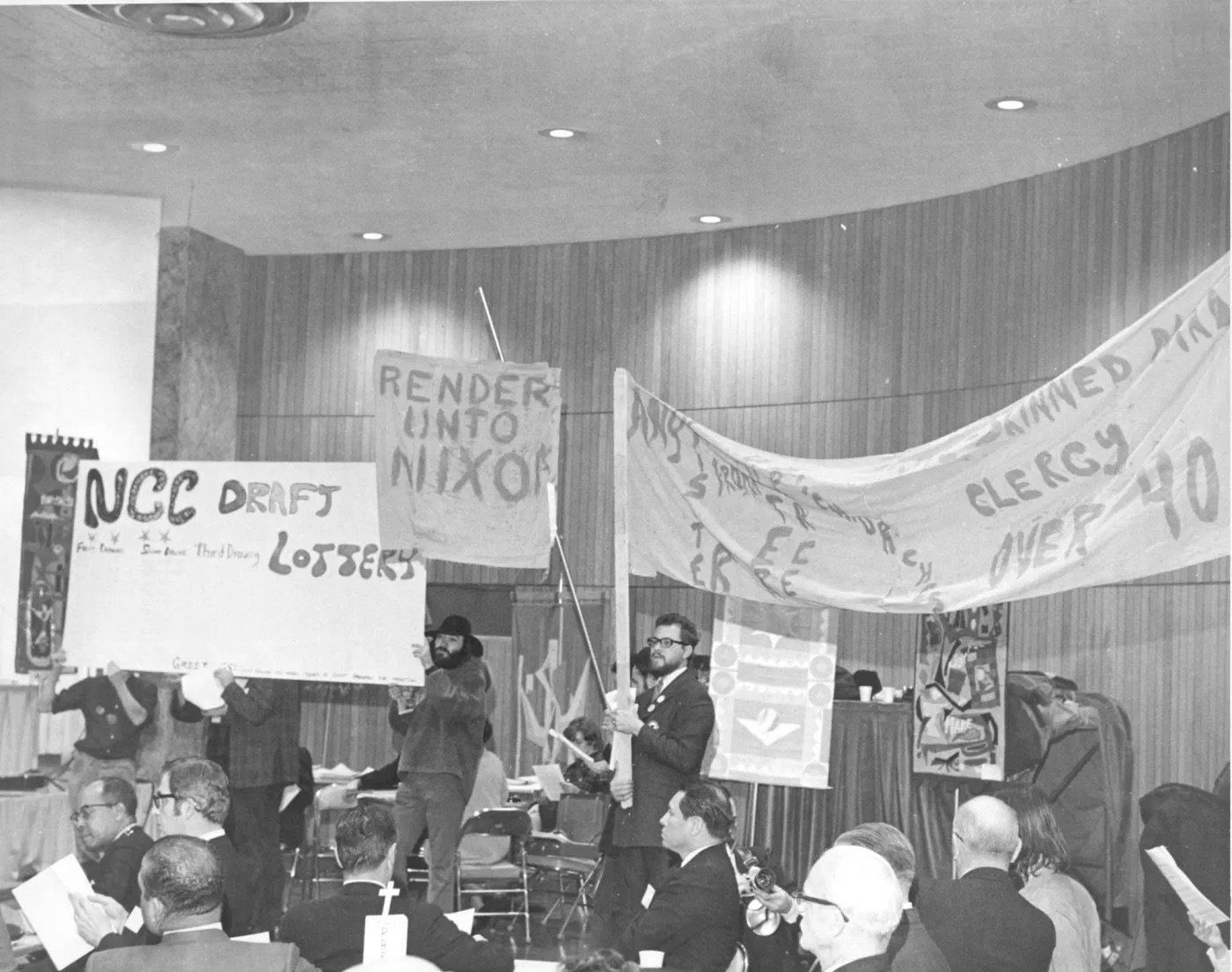Project Choose Peace
Choose resistance.
Choose hope.
Choose your future.
Choose peace.
Project Choose Peace is bringing three main goals to life:
Mapping the Path to Conscientious Objection
We are collecting comprehensive data on the process of becoming a conscientious objector across denominational lines. Our research spans multiple traditions—Episcopalian, Mennonite, Methodist, and more—so we can clearly document the routes available to those seeking to conscientiously refuse military service.
Building a Network of Support for COs
We are working with universities to create scholarships that support conscientious objectors. Since college and career pathways often align with military recruitment, we aim to provide alternative opportunities, particularly for BIPOC communities, low-income individuals, and other groups disproportionately targeted for enlistment.
Launching a National Movement for Peace
We are calling on individuals to take a stand: to publicly commit to refusing future wars and to advocate for international conflict resolution that prioritizes creativity over destruction. Through public pledges and advocacy efforts, we are building a culture where peace is not only possible but inevitable.
These are ambitious goals, but we live in urgent times. We have already gathered a coalition of scholars, faith leaders, and peace organizations committed to this vision. Join us today in making conscientious objection a viable path for all.
Support the Movement
Your gift supports the Choose Peace campaign and the broader work of Presbyterian Peace Fellowship.
Funds go toward:
Building scholarship pathways for COs
Supporting outreach and organizing
Resourcing individuals and communities resisting militarism
Join the Movement
We’re building a national network of people and organizations committed to conscientious objection. Choose where you fit and help grow this resistance.
CO Pathways by Denomination
This section outlines how various faith traditions support conscientious objection (CO) and what steps individuals can take within their tradition. If your denomination isn’t listed, or the info needs updating, please use our Update Info form below.
Can’t find your denomination?
We’re continuing to add content for Baptists, Catholics, Disciples of Christ, Evangelicals, and more. Help us: use the “Submit Updates” form below to contribute.
-
CO Stance: Actively supported via Presbyterian Peace Fellowship and historic policy backing non-violent witness donatelifedc.org+3mennoniteusa.org+3mwc-cmm.org+3centernet.pcusa.org.
Process: Contact local session or presbytery to begin discernment; seek letter of support.
Resources: Presbyterian Peacemaking Program; Presbyterian Peace Fellowship.
Contact: Peacemaking Office, Presbyterian Mission Agency — email: peace@pcusa.org
-
CO Stance: A Historic Peace Church with a long-standing, formal CO pathway centernet.pcusa.orgen.wikipedia.org+3mennoniteusa.org+3overcomingviolence.org+3.
Process: Engage congregation or youth pastor; you can create a CO file as early as a youth; resources available via Everence.
Resources: Youth CO Handbook, Peace & Justice Support Network guides.
Contact: Mennonite Peace & Justice Support Network — email on site.
-
CO Stance: No centralized policy; support is decentralized mennoniteusa.orgovercomingviolence.org+1mennoniteusa.org+1.
Process: Discuss with clergy for local discernment.
Note: Pathway remains informal.
Contact: Office of Government Relations — email: ogr@episcopalchurch.org
-
CO Stance: Varies by congregation; some active peace fellowships exist overcomingviolence.org.
Process: Engage local congregation and ministers to discern CO stance.
Contact: Fellowship of Reconciliation (US), local church leaders.
-
CO Stance: Historic Peace Church known for explicit objection since 1660s mennoniteusa.org+1en.wikipedia.org+1en.wikipedia.org+1centernet.pcusa.org+1mwc-cmm.org+3overcomingviolence.org+3en.wikipedia.org+3.
Process: Through monthly or yearly meetings; local Quaker peace offices.
Contact: American Friends Service Committee (AFSC) or Friends United Meeting offices.
-
CO Stance: One of the Historic Peace Churches, formal pathways exist en.wikipedia.org+3overcomingviolence.org+3en.wikipedia.org+3.
Process: Work with congregation leaders and denominational peace networks.
Contact: Local Church of the Brethren Peace Office.
-
CO Stance: Growing support, recognized as biblically legitimate overcomingviolence.orgen.wikipedia.org+1en.wikipedia.org+1.
Process: Engage with campus ministers or synod offices.
Contact: ELCA Social Statement authors or Lutheran Peace fellowships.
-
CO Stance: Non-combatant service is authorized; some Adventists serve in medical roles without bearing arms overcomingviolence.org+2en.wikipedia.org+2en.wikipedia.org+2.
Process: Seek guidance from church leadership for medical/noncombatant classification.
Contact: Adventist chaplains or denominational military liaison.
-
CO Stance: The 1930 Lambeth Conference affirmed war as incompatible with Christ’s teaching; Anglican Pacifist Fellowship remains active en.wikipedia.org.
Process: Consult parish, bishop, or engage with APF.
Contact: Anglican Pacifist Fellowship.
-
CO Stance: No formal stance; some ecclesial voices supportive .
Process: Varies by national jurisdiction; support may exist via Orthodox Peace Fellowship.
Contact: Orthodox Peace Fellowship; local archdiocese.



